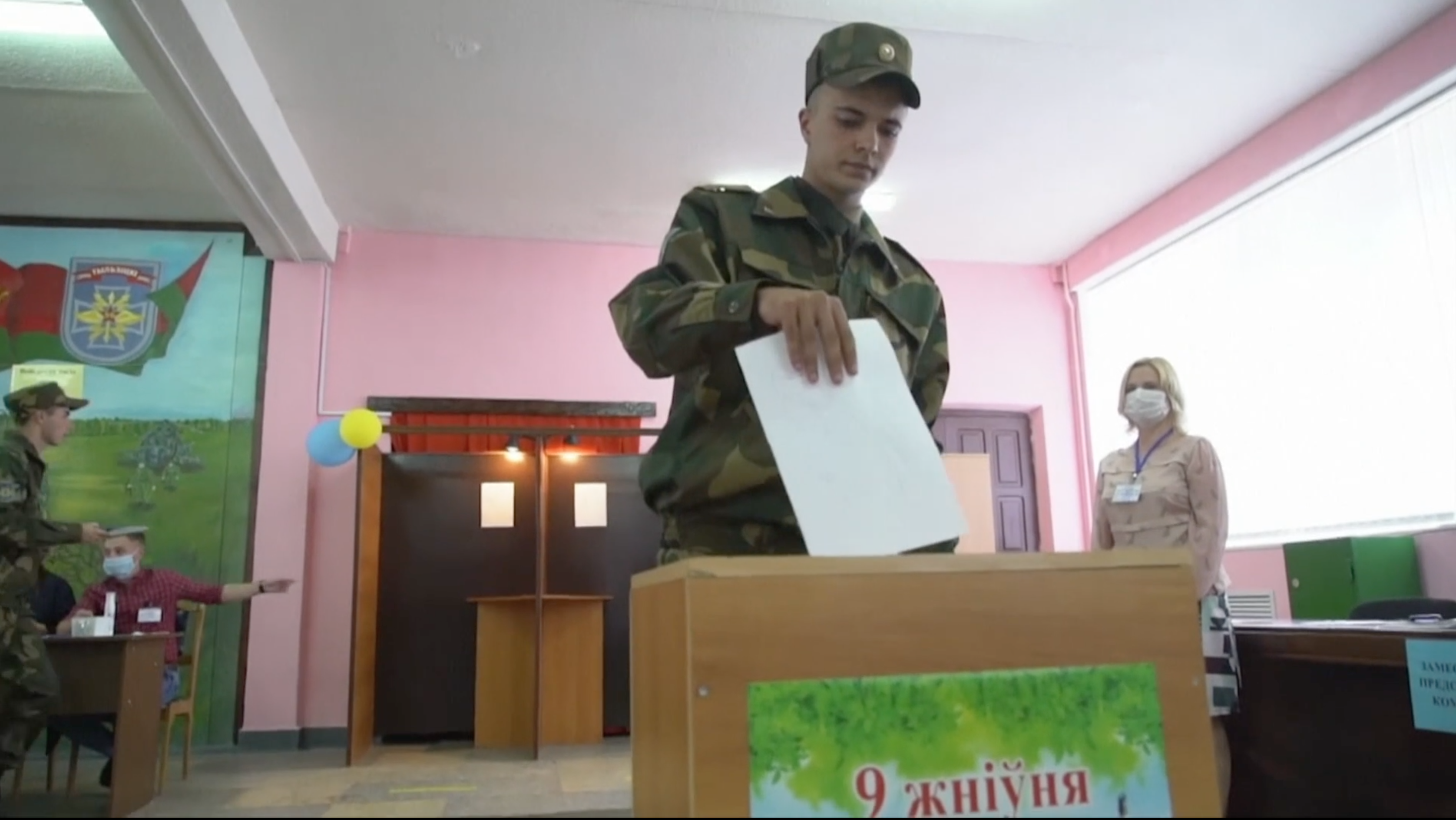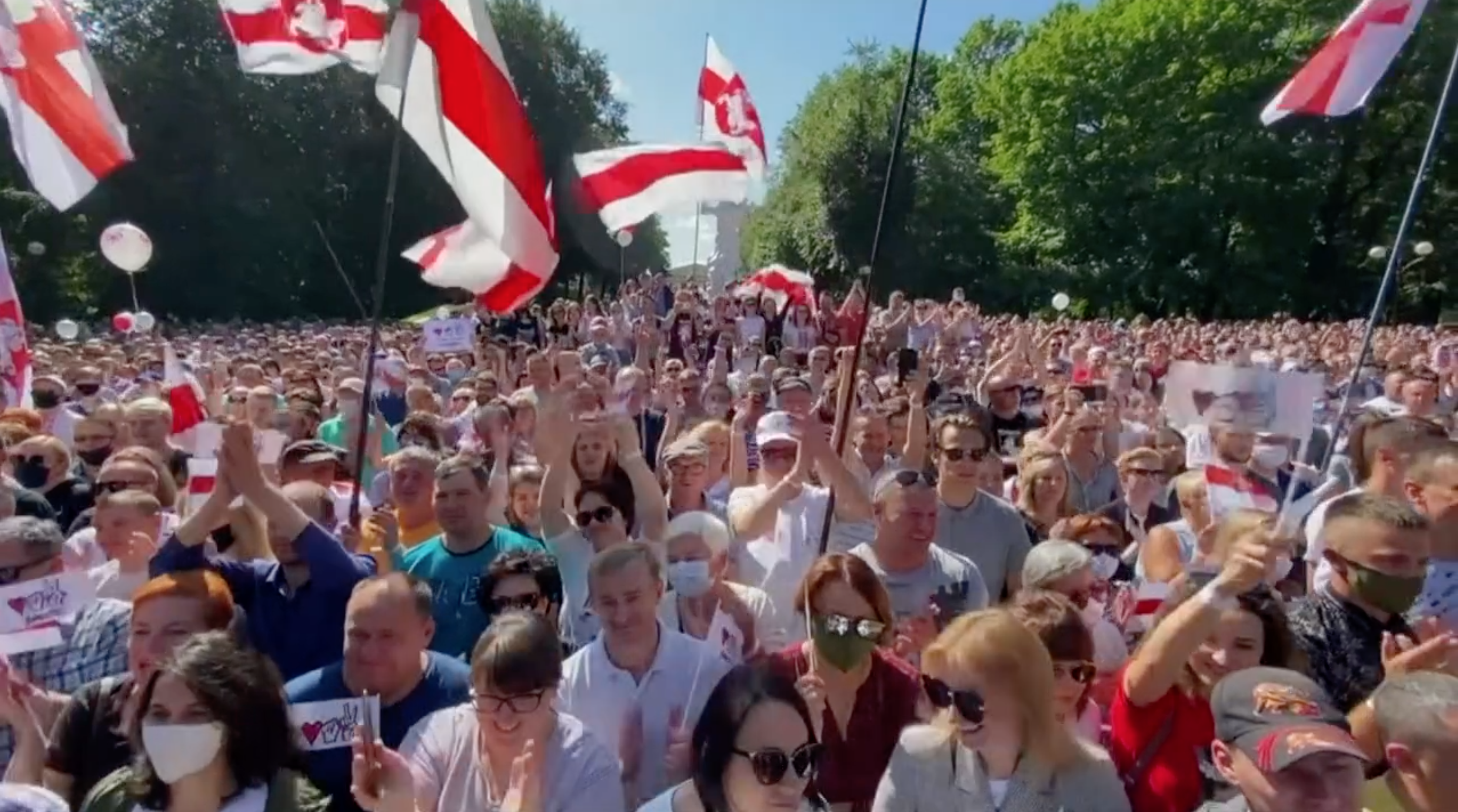
Belarusian voters went to the polls on August 9, 2020, in what turned out to be a surprisingly competitive presidential election with longtime authoritarian leader Alexander Lukashenko facing a challenge from a political novice. Over the preceding weeks, the country's relationship with its neighbor Russia soured over allegations of election interference. Special Correspondent Simon Ostrovsky reports.
Read the following transcript:
Hari Sreenivasan:
Tomorrow, voters in Belarus will cast their ballots in a surprisingly competitive presidential election. Authoritarian leader Alexander Lukashenko is facing a challenge from a political novice after ruling for more than a quarter century.
As Special Correspondent Simon Ostrovsky reports, it's an election where the country's relationship with its neighbor to the east, Russia, looms large.
Simon Ostrovsky:
These are pictures of the Belarusian security service arresting men it claims are mercenaries from Russia last week.
According to Belarus state television, Moscow sent them to stir up chaos ahead of tomorrow's presidential elections.
Belarus 1 broadcaster:
The hotel administration became suspicious of the visitors because of their unusual behavior for Russian tourists. They did not drink alcohol or visit entertainment venues. They kept apart and tried not to draw attention to themselves.
Simon Ostrovsky:
State TV displays the men's personal belongings, parading them for the whole country to see on their television sets. It's an unusual bout of hostility for two countries, which until recently considered themselves the closest of allies. But in Belarus, these are unusual times.
Sviatlana Tsikhanouskaya:
I am tired of being silent. I am tired of being afraid. And you – are you tired of being patient? Are you tired of being silent?
Simon Ostrovsky:
For weeks now the public has been rallying around this woman. Sviatlana Tsikhanouskaya is running as the sole opposition candidate in a surprisingly contested election for a country that's been run by the same man for over a quarter century.
She threw her name in the hat after her husband – a video blogger – was jailed and barred from running. Two other opposition leaders were also struck from the ballot. One fled the country, the other was imprisoned.
Tsikhanouskaya has gathered massive rallies like this one, attended by thousands of supporters in towns and cities throughout the nation, something that has never happened in this tightly run dictatorship before.
Today, Belarus' leader, Alexander Lukashenko, faces a wave of discontent he's never seen before. Earlier this year Russia hiked energy prices as part of a pressure campaign to push Belarus into an ever closer political union. Then the coronavirus pandemic hit, which he dismissed as something you could treat with a shot of vodka. Now, thousands of Belarusians who usually earn money abroad are stuck penniless at home.
It's a perfect storm, but Belarus' embattled president isn't ready to give up the reigns of power just yet.
Alexander Lukashenko:
We won't let you take our country!
Simon Ostrovsky:
Central to his plan to stay in power are the arrests of the alleged Russian mercenaries, who his security services accuse of arriving in Belarus to help Tsikhanouskaya's jailed husband sow discord.
Alexander Lukashenko:
These people, they have given testimony, they were sent to Belarus specifically, their orders were to wait. We have our own country, the country has laws, no one knows our laws better than our dear Russian brothers and their leadership.
Simon Ostrovsky:
It's a scenario that may be ringing bells for those who remember the crisis in Ukraine's Crimea peninsula in 2014. Uniformed men without national insignia, who later turned out to be Russian soldiers, appeared in key locations to wrest control of the territory away from Ukraine after a revolution created a power vacuum there.
Arseny Sivitsky:
The Kremlin understands that it is a real opportunity for them to advance Russian national interests now in Belarus, especially because Lukashenko is in a very vulnerable and weak position.
Simon Ostrovsky:
Arseny Sivitsky is director of the Center for Strategic and Foreign Policy Studies in Minsk, an independent think tank. He told NewsHour Weekend he feared Russia could use the political instability in his country to overthrow the regime in favor of a more pliable leader or worse.
Arseny Sivitsky:
It seems that we are preparing for a major battle with the Russians, not only in the political sphere, but also a military one. I'm a military officer in reserve. So two weeks ago, I received the mobilization call from the recruitment office and I was told that I need to be prepared for snap mobilization in case something goes wrong.
Simon Ostrovsky:
Russia hasn't taken the allegations of election meddling sitting down. Foreign Ministry spokeswoman Maria Zakharova called the arrests of the alleged military contractors nothing more than a "play," adding ominously that Minsk knows Russia won't let any harm befall its citizens.
With no international observers invited to monitor Sunday's polls, Katsiaryna Shmatsina of the Belarusian Institute for Strategic Studies fears Lukashenko is planning to falsify the vote in his own favor and use the alleged Russian mercenary plot to besmirch the opposition in the eyes of the public as being sponsored by foreigners but also to send a message to Washington and the EU.
Katsiaryna Shmatsina:
Either support Lukashenko, who is a politician who provides the sovereignty of Belarus or otherwise, said there's someone new coming in. He or she might be not able to contain the Russian aggression.
Simon Ostrovsky:
Meanwhile, Belarusian police have taken a harder stance on rank and file opposition supporters arresting close to a thousand over the last few weeks, according to Shmatsina, even though political rallies are sanctioned ahead of elections.
Whatever happens in Sunday's vote, be it an unlikely Tsikhanouskaya victory, or a crackdown on the political opposition, Belarus is in for a tense few weeks as its larger neighbor to the east waits and watches.





